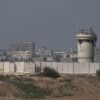The State of Israel is suspected of committing genocide in Gaza. That is the view of 15 of the 17 judges of the International Court of Justice (ICJ) after considering the case filed by South Africa in the last days of 2023. The Court’s order for urgent provisional measures issued on 26 January will not stop the suffering of Palestinians and Israelis or end the conflict all of a sudden, but it will have a far-reaching significance. It is unprecedented in the almost 76 years of Israeli-Palestinian conflict and shatters a widespread perception that Israel can act with impunity.
The UN’s highest judicial body has given credence to the existence of a real and imminent risk of irreparable prejudice to the rights protected by the Convention on the Prevention and Punishment of the Crime of Genocide, as well as to indications that Israeli political and military leaders have shown an intention to commit (or have failed to prevent) acts of genocide against the Palestinian people in Gaza. This is a situation in which no state would wish to find itself.
The ICJ’s order does not question Israel’s right to self-defence but does make it clear that such a right is not unlimited and must be governed by universal rules, something that Israel seems to be plausibly in breach of.
Numerous observers, including some supporters of Israeli policies, have noted that the ICJ has not ordered an immediate ceasefire. There are serious doubts that the Israeli leadership would have implemented such a ceasefire had it been ordered. Moreover, the Court has no instruments of its own to enforce compliance. More importantly, the Court only deals with disputes between states, so Hamas and other Palestinian groups are not part of the dispute raised by South Africa (other instances such as the International Criminal Court –ICC– are available to judge their actions). It was not plausible for the ICJ to have imposed a ceasefire on only one of the parties to an active armed conflict.
The urgent provisional measures imposed on Israel by the Court at The Hague oblige it to take all necessary measures to prevent genocidal acts, including by its own military, and to prevent and punish any incitement to such acts. In addition, Israel is obliged to urgently enable the provision of basic services and humanitarian assistance to the Palestinians in Gaza. The Israeli Prime Minister, Benjamin Netanyahu, had anticipated such an order and warned that ‘nobody will stop us – not The Hague’. Statements like that might induce public opinion to keep him in power, but will hardly help the position of the state of Israel when it is on trial for possible genocide.
The ICJ’s order does not question Israel’s right to self-defence but does make it clear that such a right is not unlimited and must be governed by universal rules, something that Israel seems to be plausibly in breach of. The first impact of such an order is that the UN’s highest judicial authority dismantles the Israeli narrative that its actions in Gaza are justified by its right to self-defence against Hamas. Documented evidence of possible genocidal acts intended to cause irreparable prejudice to the Palestinian people mean that Israel is included in the short list of states that are on trial for committing the ‘crime of crimes’.
The recent ICJ order marks a turning point in the long-running Israeli-Palestinian conflict, both because of the gravity of the accusation against Israel and the near unanimity among the judges who issued the provisional measures (several Israeli leaders immediately accused them of anti-Semitism). Within a month, the Israeli authorities have to demonstrate that they are complying with The Hague Court’s orders, starting from a defensive position and in the midst of a war that Netanyahu wants to prolong over time.
Before Israel is due to submit its report at the end of February, the ICJ order is expected to be taken to the UN Security Council, where a resolution demanding an immediate ceasefire in Gaza will once again be put to a vote. The US has used its veto power on several occasions to prevent a ceasefire since the unprecedented outbreak of violence on 7 October. However, the Biden Administration has found itself increasingly isolated and even criticised by governments of friendly countries.
President Biden could use the veto again in the Security Council after the ICJ order, but the cost of doing so would be much higher, especially during an election year in the US. His country’s image would be further damaged in many corners of the globe and the perception of hypocrisy would deepen, with Washington claiming to uphold international legality in other conflict scenarios such as the Ukraine.
For the Palestinians, the ICJ’s order may seem a small moral victory, but its implications could be far greater than is now realised. The Hague’s decision opens up the possibility for governments, international organisations and civil movements to take measures with moral and legal implications that will contribute to Israel’s international isolation, as was the case with Apartheid South Africa and the former Yugoslavia. Israel will have to choose between maintaining or changing its policies towards the Palestinians and towards seeking normalisation with its Arab neighbours. The cost of continuing to maintain the military occupation, relying on unconditional US support, is likely to increase over time.
Should current and future Israeli leaders choose to maintain their policies in the short term (collective punishment and possible war crimes in Gaza and the West Bank) and in the longer term (blocking any peace process based on the ‘land for peace’ principle), Israel’s international isolation will deepen. A case in point is the vote at the UN General Assembly on 19 December on the Palestinian people’s right to self-determination. Up to 172 states voted in favour and 10 abstained. Only four voted against: the US, Israel, Micronesia and Nauru.
World public opinion has returned to the Israeli-Palestinian conflict after a long period of lack of interest or apathy. In several countries, the generational factor is key, with young people far more critical of Israel’s actions than their elders. This is the case in the US. The disconnection between the attitudes of some Western (and Arab) leaders towards the conflict and the perceptions of their public opinions may grow, leading to clashes or policy changes.
The catastrophic conditions of Gaza’s population, according to all relevant international refugee, health, food and humanitarian agencies, are disseminated through social media and displayed on mobile phone and television screens across the globe. The recent ICJ order places these images within the framework of potential genocide, something that has never had a legal manifestation in almost eight decades of conflict.
The recent ICJ order can be seen as a setback for the EU –for its internal divisions and inability to offer solutions– and for some of its member states –for their unconditional support for the Netanyahu government and their criticism of the case filed by South Africa–. It is time for Europe’s governments to review their positions, abide by the ICJ’s order, overcome their divisions and support High Representative Josep Borrell’s efforts to consolidate a process leading to two states: one Israeli and one Palestinian, living side by side with security guarantees and recognised by all the states of the world.
It is remarkable that, with this case, South Africa and the many countries of the so-called ‘global south’ that have supported it are not only seeking to protect the Palestinian people from an imminent risk of genocide, but also to defend the validity of the rules-based international system. The same international system that was designed by the very same Western powers that today look the other way from what is happening in Gaza.
(*) Originally published in the Spanish daily El Mundo on 29/I/2024.
Elcano Comments
This is a new initiative of the Institute that aims to offer analyses by experts on topics that are within the scope of our research agenda. They are published on no regular basis but as opportunity arises in accordance with the advice of the broader academic community in cooperation with the Elcano Royal Institute.



